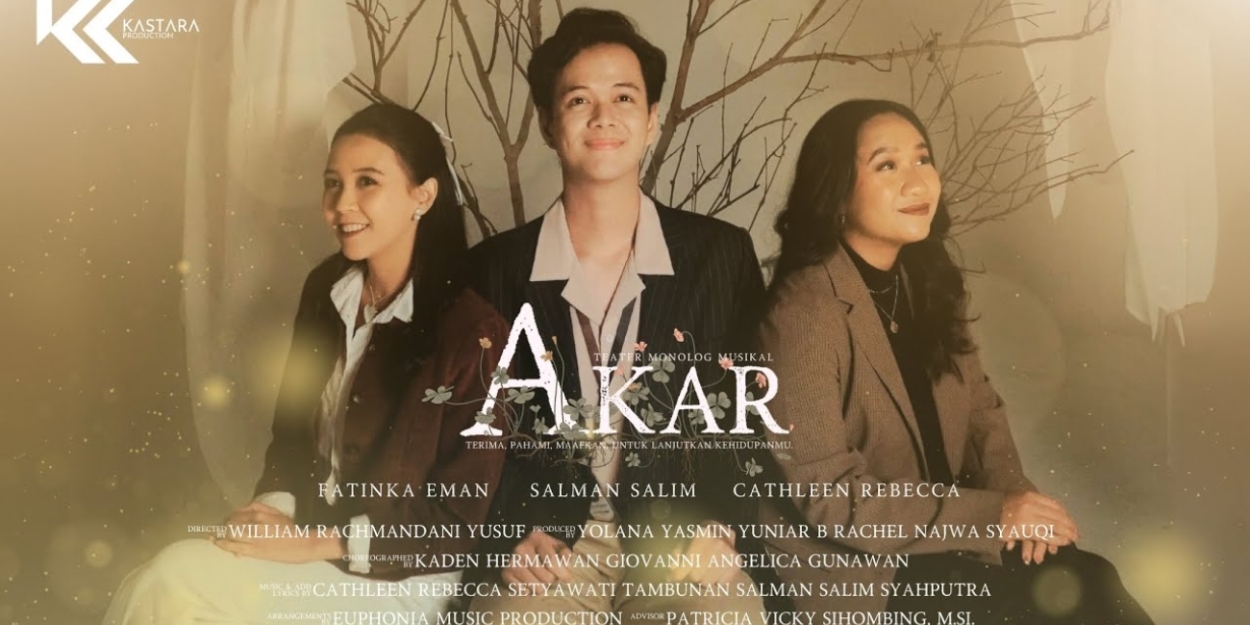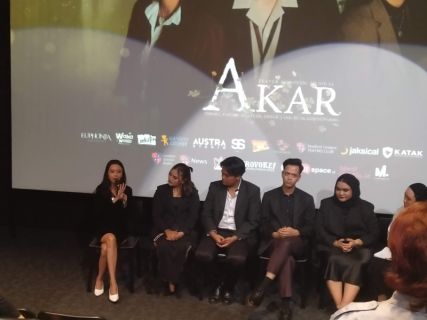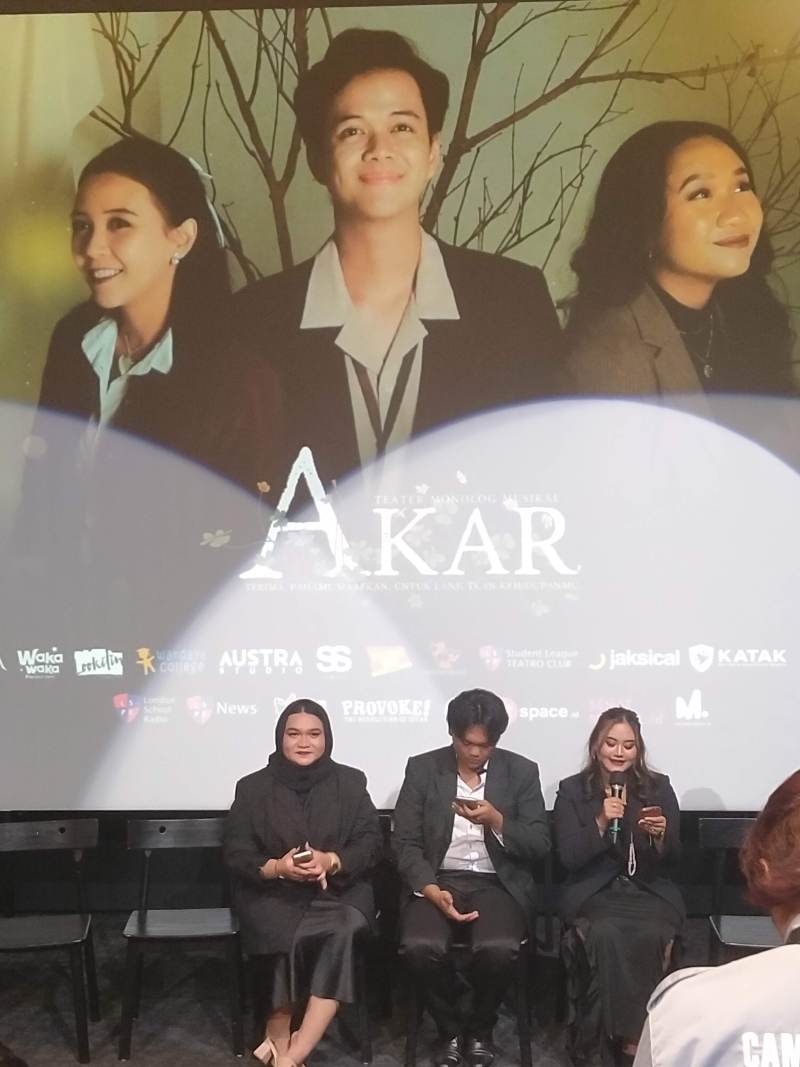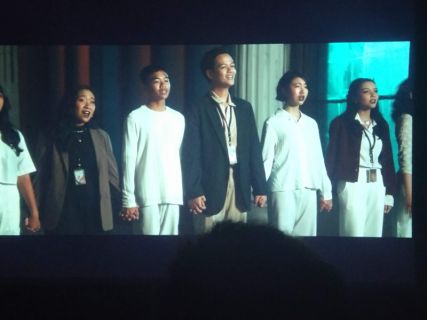Review: Musical Monolog AKAR Highlights the Importance of Mental Health
This musical by KASTARA Production is available now on YouTube.

The production house and PR agency KASTARA Production debuted their inaugural work on May 26, 2024. Titled Musical Monologue AKAR, it seeks to highlight the importance of mental health through musical monologues sung by three characters, each struggling with a different personal issue. The 30-minute web video is available to watch for free on YouTube.
AKAR is written and directed by William Rachmandani Yusuf and choreographed by M. Kaden Hermawan and Giovanni Angelica Gunawan. The songs were composed by William Rachmandani Yusuf, Cathleen Rebecca Setyawati Tambunan, and Salman Salim Syahputra, with the latter two also serving as co-music directors. On the production side, Yolana Yasmin Yuniar B. and Rachel Najwa Syauqi served as production managers.
AKAR’s narrative focuses on three characters: Wilasa Ramandra Yuswara (Salman Salim Syahputra), Rana Nona Shabiya (Fatinka Ainindita Ashari Eman), and Yasmin Yasha Yanuar diperankan (Cathleen Rebecca Setyawati T.). As a series of monologues, the three characters’ stories don’t intertwine, but are rather thematically linked through their struggles with mental health.

Structurally, AKAR begins with each character singing about their internal turmoil. These songs’ lyrics contain poetic musings rather than narrative clarity, merely hinting at the source of their problems. Shortly after, each character is given a spoken monologue that sheds light on the specific nature of their personal issue and its cause.
In the following scene, the three characters reach their lowest points, even contemplating taking their own lives. This time, we see the ensemble members (Abiashafa Nada, Detilian, Felyshia, Novenda Charity Muljono, Rachel Maretta, and Syafina Damayanti) join them, portraying their tumultuous mental state.
And in the final scene, we see Wilasa, Rana, and Yasmin coming to terms with their past and present. With the words ‘terima, pahami, maafkan’ (‘accept, understand, forgive’), the characters embark on the process of healing by accepting, understanding, and forgiving whatever may have caused them anguish, and take a step towards the future.
In recent years, the awareness of mental health has steadily risen in Indonesia, led by Gen Z through social media. KASTARA Production also cites this trend as the reason behind AKAR. They seek to further promote the importance of engaging with mental health issues in a healthy way.
Tackling social issues through theatrical works can be a double-edged sword. When done well, they can be a uniquely personal way of rousing people’s intellectual and emotional interest in said issues. However, when it’s done without enough research or earnestness, it can come across as manipulative, disingenuous, or even ruinous to the issue at hand. We’ve seen the latter case not too long ago in the local theater scene.

Thankfully, Musical Monologue AKAR is obviously a labor of love.
The founders of KASTARA Production have opened up at the press conference that the story is inspired by personal struggles that the three of them have faced. They also treat the subject matter with sensitivity, kindness, and optimism. The slogan #TerimaPahamiMaafkan (#AcceptUnderstandForgive) embodies that sense of mindful approach to mental health issues.
That being said, the resulting work is a mixed bag; it has its strengths but also a few flaws.
The choice to present three different characters with three different problems is a significant one. On one hand, it shows that mental struggles can come from different sources: a failed romance, a demanding family, and so on. But it also sacrifices a bit more depth in exchange for the breadth of problems.
The three characters also have different ways of expressing their thoughts. Of course, dramaturgically, this makes good sense, since different people do have different ways of conveying what’s on their mind. But as a viewer, it can be a bit frustrating when you can understand the exact nature of the problems that two of the characters face, while the other character only makes vague allusions of the source of their suffering. What is there is enough to make some assumptions, but it might hinder some audience members from relating to said character. After all, it is hard to know if you feel the same as someone if you don’t know what they’re feeling beyond a general sense of sorrow.
As for the actors, they did admirable, competent work.They are not afraid to show raw emotions, a much needed aspect of a theatrical work dissecting mental health issues. Although they’re reciting or singing poetic monologues, their acting comes across as genuine and vulnerable rather than overdone. At some parts, the emphasis or pause in the monologue feels a little bit unnatural, but it can be overlooked..

Back to the story, AKAR’s ending also comes quite abruptly. Although the musical portrays their struggles and lowest point quite convincingly, the hopeful resolution arrives just a bit too easily.
The most difficult part of recovering from a mental health problem is, typically, to finally break through the dreary mire of negative thoughts clouding one’s mind and finally take steps towards healing. It might have been a more satisfying and smooth watch if we could see Wilasa’s, Rana’s, and Yasmin’s efforts before they finally get their mental breakthrough.
As for the music, the songs are all pleasant enough to listen to. The actors also did a great job in singing these melodies. But the songs can sound pretty similar at times, and it might have been better if each character had a more obvious difference to their own parts, to give them more distinct personalities through the music.The songs also tend to run for a bit long with not enough variation to keep it interesting melodically.
The production design is great, with effective use of sets, props, and costuming. They help the audience get a better sense of each character’s personality and circumstances. The only major note is that the lighting is a bit too dark most of the time and, alongside the brooding mood and slightly repetitive melodies, it doesn’t help the audience to focus on the story at hand..
As their first work, KASTARA Production has proven that they have their heart in the right place – they’re not afraid to make a personal work supporting an important issue close to their hearts. Although the resulting work is still rough around the edges, it doesn’t diminish the value of such sincerity and empathy. And, although I personally can’t connect to these characters, I’m positive that others will find inspiration and even encouragement from this meaningful work. That is the dilemma of such a personal work: it will connect so deeply to some while alienating others. But if it can save even one person, it will have been worth it.
Reader Reviews

Videos
